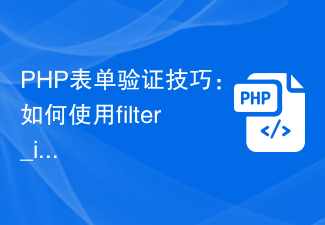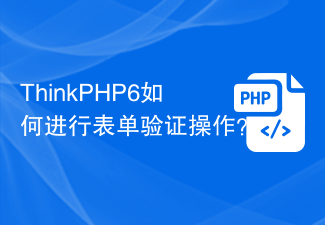With the development of web applications, form validation has become a must for web development. In web applications, form validation is the process of ensuring the integrity and accuracy of entered data. Form validation prevents users from entering invalid data and keeps web applications secure. When developing web applications, we use various programming languages and frameworks to implement form validation. In this article, we will explore how to use PHP and Smarty template engine for form validation.
PHP is one of the most popular scripting languages for web development and is popular for its feature-rich nature and ease of learning. Smarty is a commonly used PHP template engine that provides a simple and reusable way to build web pages. The main function of Smarty is to separate Web pages and PHP code, allowing developers to focus more on business logic and Web page design.
In this article, we will use PHP and Smarty template engine to validate the form. We will first create a simple form and then use PHP and the Smarty template engine to validate the form data. Finally, we'll show how to store form data in a database.
Create form
First, we will create a simple form to understand how PHP and the Smarty template engine validate form data. We will create a form with three fields, name, email address, and password.
In the above code, we create a form with three fields using the HTML form element. We also use some JavaScript code to ensure the email address is formatted correctly. In the next steps we will complete the form validation.
Validate form data using PHP and Smarty
In order to validate the form data, we need to create a PHP script that uses the Smarty template engine to render the form and validate the form data. In the code below, we use PHP and Smarty template engine to validate the form data.
In the above code, we first include the Smarty class using the require_once function, and then create the Smarty object. We then defined some variables to store the form data including name, email address and password. Next, we use the Smarty template engine to render the form and display validation error messages to the user.
In the code below, we use the Smarty template engine to render the form and validate error messages.
In the above code, we use Smarty template engine to render the form and validate the error message. We use Smarty template tags to extract the form data and validation error messages and insert them into the HTML form. We also use Smarty template tags to check if the form fields are empty and display an error message if necessary.
Storing form data
Once we have validated the form data, we can store them in the database. In the code below, we are using PHP and MySQL to store the form data.
In the above code, we first create a PDO object named $db, and then store the form data in the database. We use the bindParam function to bind the values of the form fields and the execute function to insert them into the database.
Conclusion
In this article, we explored how to validate form data using PHP and the Smarty template engine. We first created a simple form and then used PHP and the Smarty template engine to validate the form data. Finally, we showed how to store form data in a database. Using PHP and the Smarty template engine for form validation ensures the integrity and accuracy of input data and maintains the security of your web application.
The above is the detailed content of Form validation using PHP and Smarty template engine. For more information, please follow other related articles on the PHP Chinese website!
 如何使用Flask-WTF实现表单验证Aug 03, 2023 pm 06:53 PM
如何使用Flask-WTF实现表单验证Aug 03, 2023 pm 06:53 PM如何使用Flask-WTF实现表单验证Flask-WTF是一个用于处理Web表单验证的Flask扩展,它提供了一种简洁、灵活的方式来验证用户提交的数据。本文将向您展示如何使用Flask-WTF扩展来实现表单验证。安装Flask-WTF要使用Flask-WTF,首先需要安装它。可以使用pip命令来安装:pipinstallFlask-WTF导入所需模块在F
 php如何使用CodeIgniter4框架?May 31, 2023 pm 02:51 PM
php如何使用CodeIgniter4框架?May 31, 2023 pm 02:51 PMPHP是一种非常流行的编程语言,而CodeIgniter4是一种常用的PHP框架。在开发Web应用程序时,使用框架是非常有帮助的,它可以加速开发过程、提高代码质量、降低维护成本。本文将介绍如何使用CodeIgniter4框架。安装CodeIgniter4框架CodeIgniter4框架可以从官方网站(https://codeigniter.com/)下载。下
 Laravel开发:如何使用Laravel Validation验证表单请求?Jun 13, 2023 pm 01:34 PM
Laravel开发:如何使用Laravel Validation验证表单请求?Jun 13, 2023 pm 01:34 PMLaravel是一个流行的PHPWeb开发框架,它提供了很多方便的功能来加快开发者的工作。其中,LaravelValidation是一种非常实用的功能,它可以帮助我们轻松地验证表单请求和用户输入的数据。本文就将介绍如何使用LaravelValidation验证表单请求。什么是LaravelValidationLaravelValidation是La
 如何使用Golang实现Web应用程序的表单验证Jun 24, 2023 am 09:08 AM
如何使用Golang实现Web应用程序的表单验证Jun 24, 2023 am 09:08 AM表单验证是Web应用程序开发中非常重要的一个环节,它能够在提交表单数据之前对数据进行有效性检查,避免应用程序出现安全漏洞和数据错误。使用Golang可以轻松地实现Web应用程序的表单验证,本文将介绍如何使用Golang来实现Web应用程序的表单验证。一、表单验证的基本要素在介绍如何实现表单验证之前,我们需要知道表单验证的基本要素是什么。表单元素:表单元素是指
 PHP表单验证技巧:如何使用filter_input函数检验用户输入Aug 01, 2023 am 08:51 AM
PHP表单验证技巧:如何使用filter_input函数检验用户输入Aug 01, 2023 am 08:51 AMPHP表单验证技巧:如何使用filter_input函数检验用户输入引言:在开发Web应用程序时,表单是与用户进行交互的重要工具。而正确地验证用户输入,是保证数据的完整性和安全性的关键步骤之一。PHP提供了filter_input函数,可以方便地对用户输入进行验证和过滤。本文将介绍如何使用filter_input函数来检验用户输入,并提供相关的代码示例。一、
 PHP中的表单验证和过滤方法?Jun 29, 2023 pm 10:04 PM
PHP中的表单验证和过滤方法?Jun 29, 2023 pm 10:04 PMPHP作为一种广泛应用于Web开发的脚本语言,其表单验证和过滤是非常重要的一部分。在用户提交表单的过程中,需要对用户输入的数据进行验证和过滤,以确保数据的安全性和有效性。本文将介绍PHP中如何进行表单验证和过滤的方法和技巧。一、表单验证表单验证是指对用户输入的数据进行检查,以确保数据符合特定的规则和要求。常见的表单验证包括对必填项的验证、邮箱格式、手机号码格
 ThinkPHP6如何进行表单验证操作?Jun 12, 2023 am 09:36 AM
ThinkPHP6如何进行表单验证操作?Jun 12, 2023 am 09:36 AMThinkPHP6是一款基于PHP的MVC框架,极大地简化了Web应用程序的开发。其中表单验证是一个非常基础和重要的功能。在这篇文章中,我们将介绍ThinkPHP6中如何进行表单验证操作。一、验证规则定义在ThinkPHP6中,验证规则都需要定义在控制器中,我们可以通过在控制器中定义一个$validate属性来实现规则的定义,如下所示:usethinkVa
 Golang学习之Web应用程序的表单验证实践Jun 24, 2023 pm 03:07 PM
Golang学习之Web应用程序的表单验证实践Jun 24, 2023 pm 03:07 PM在Web开发中,表单验证是一个极其关键的部分。表单验证可以有效地保护数据的安全性,防止非法用户的攻击和恶意操作。在Golang中,表单验证技术也应用广泛,特别是在Web应用程序中。本文将介绍Golang中Web应用程序的表单验证实践。一、表单验证的基本原理在Web应用程序中,表单验证的基本原理是在Web页面提交数据之前进行数据的检查和验证。这些数据可能是用户


Hot AI Tools

Undresser.AI Undress
AI-powered app for creating realistic nude photos

AI Clothes Remover
Online AI tool for removing clothes from photos.

Undress AI Tool
Undress images for free

Clothoff.io
AI clothes remover

AI Hentai Generator
Generate AI Hentai for free.

Hot Article

Hot Tools

mPDF
mPDF is a PHP library that can generate PDF files from UTF-8 encoded HTML. The original author, Ian Back, wrote mPDF to output PDF files "on the fly" from his website and handle different languages. It is slower than original scripts like HTML2FPDF and produces larger files when using Unicode fonts, but supports CSS styles etc. and has a lot of enhancements. Supports almost all languages, including RTL (Arabic and Hebrew) and CJK (Chinese, Japanese and Korean). Supports nested block-level elements (such as P, DIV),

Dreamweaver CS6
Visual web development tools

SublimeText3 Mac version
God-level code editing software (SublimeText3)

SublimeText3 Linux new version
SublimeText3 Linux latest version

SublimeText3 English version
Recommended: Win version, supports code prompts!






